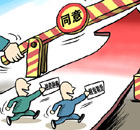Opinion
What's behind US pressure on renminbi exchange rate?
(Xinhua)
Updated: 2010-02-20 10:12
 |
Large Medium Small |
BEIJING: US political rhetoric has recently been obsessed with the exchange rate of the renminbi. President Barack Obama has indicated on several occasions that he would take a tougher stance on this issue in order to address trade imbalances between his country and China.
But does the renminbi hold the key to this issue? What are the backstage calculations behind those demands from Washington?
Renminbi a wrong target
While addressing Democratic senators early this month, Obama said the issue of renminbi exchange rate must be addressed to ensure that American products will not be put into a huge competitive disadvantage given the fact that China is going to be one of America's biggest markets.
In an interview with Businessweek on Feb 10, Obama said he and Chinese leaders are going to have some "very serious negotiations" on the renminbi issue.
Supporters of Obama include economists such as Gary Hufbauer, a senior fellow at the Peterson Institute for International Economics. Those experts say China's huge trade surplus is a result of an undervalued renminbi. Appreciation of the Chinese currency, in their view, would re-balance China's international trade.
However, the validity of such argument is questionable.
The Japanese yen, for example, has been appreciated enormously against the US dollar over the past 40 years. Yet Japan's trade surplus with the United States has been continuously on the increase over the same period.
The case with the Japanese yen has clearly demonstrated that international payment is not necessarily entirely linked to currency exchange rates. International trade balance is rather determined by international division of labor and product competitiveness.
Stephen King, chief economist of the HSBC bank, said it is unreasonable to simply attribute China's big trade surplus to an undervalued currency. China's high savings rate is a more important factor in this respect, he told Xinhua.
Nobel Prize laureate Andrew Michael Spence shared King's argument.
"Reducing the surplus in China involves deep structural change, much as reducing the US deficits does. China's high savings are embedded in the structure of the economy," Spence wrote in Jan 21's Financial Times.
Without structural change, an appreciation of the renminbi might well lead to continued high savings and slow economic growth in China, rather than to a reduction of China's trade surplus, he wrote.
International Monetary Fund (IMF) chief economist Olivier Blanchard believes that renminbi appreciation is not a solution for the US economy.
According to an IMF model, the American GDP will grow by 1 percent when the renminbi appreciates by 20 percent and other major Asian currencies also appreciate by a similar margin, he told Xinhua.
"This would be good news for US growth. But this is clearly not enough, by itself to sustain growth in the United States," said Blanchard.
World Bank chief economist and Vice President Justin Yifu Lin also said that the appreciation of the renminbi will not solve the problem of trade imbalance between China and the United States. On the contrary, such a move might damage both economies.
China bashing not helpful
Obama has frequently attacked China over the renminbi issue in recent months. His motives are thought-provoking.
In an article titled "Obama bashes China in order to win midterm elections," Japanese weekly Choice pointed out that after one year in office, the US president now faces a sharp drop in approval ratings, a double-digit unemployment ratio and the loss of Democratic "supermajority" in the Senate.
Trying to win the midterm elections under such circumstances, Obama had moved toward a "China-bashing" policy since the end of last year, including imposing high tariffs on Chinese products and pressuring China on renminbi exchange rate.
But the truth is China has become the largest victim of US trade protectionism since the outbreak of the global financial crisis.
According to statistics released by the United States International Trade Commission, there were roughly 50 trade remedy cases filed by the United States between January and November 2009, half of which targeted China.
At the end of last year, Chinese Premier Wen Jiabao said in an exclusive interview with Xinhua that some foreign countries kept asking China to appreciate its currency while using various protectionist measures against China. Their real motive was to contain China's growth, he said.
Wen reiterated that China will never yield to external pressures on the exchange rate issue.
In essence, a country's exchange rate policy is a matter of sovereignty.
During a meeting with a visiting delegation of US Chamber of Commerce in May 2005, Wen made it clear that the reform of renminbi's exchange rate was a sovereign right of China, and that every country had the right to choose a foreign exchange system compatible to its own national conditions and a reasonable exchange rate level.
Wen said China would obey the rules of a market economy, but would never give in under foreign pressure.
Any foreign pressure or attempt to manipulate the issue via news media represented a politicization of economic issues, which was unhelpful, the premier added.
George Gilder, founder of Discovery Institute, said that it is neither realistic nor helpful for the United States to raise the renminbi exchange rate issue again with China.
Pieter Bottelier, former chief of the World Bank's Resident Mission in China, told Xinhua that China and the United States share broad common interests.
A prosperous, stable and strong China is in the interests of the United States and vice versa, said Bottelier. The two nations need to settle their differences through various dialogue mechanisms, he added.
In recent years, China has been making efforts to balance international. The renminbi has been steadily appreciated against the US dollar and the euro.
Between July 2005, when China began its renminbi exchange rate reform, and the end of 2009, the value of the renminbi has appreciated by 21.21 percent against the US dollar and up by 2.21 percent against the euro.
| ||||
In 2009, US exports to China amounted to $77.4 billion, accounting for an increasingly larger share in the country's total exports.
During the same period, US trade deficits with China dropped by 16 percent year-on-year.
In the Asian financial crisis of late 1990s, China won worldwide applause for keeping a stable exchange rate of the renminbi.
In the ongoing global financial crisis, while the world's major currencies all lost value, China has remained committed to a responsible renminbi exchange rate policy and has made significant contributions to the recovery of the global economy.
Many experts familiar to China-US trade pointed out that in order to achieve trade balance, the United States should take positive and concrete steps, such as increasing hi-tech exports to China and allowing Chinese firms to acquire shares in US financial and technology sectors.













